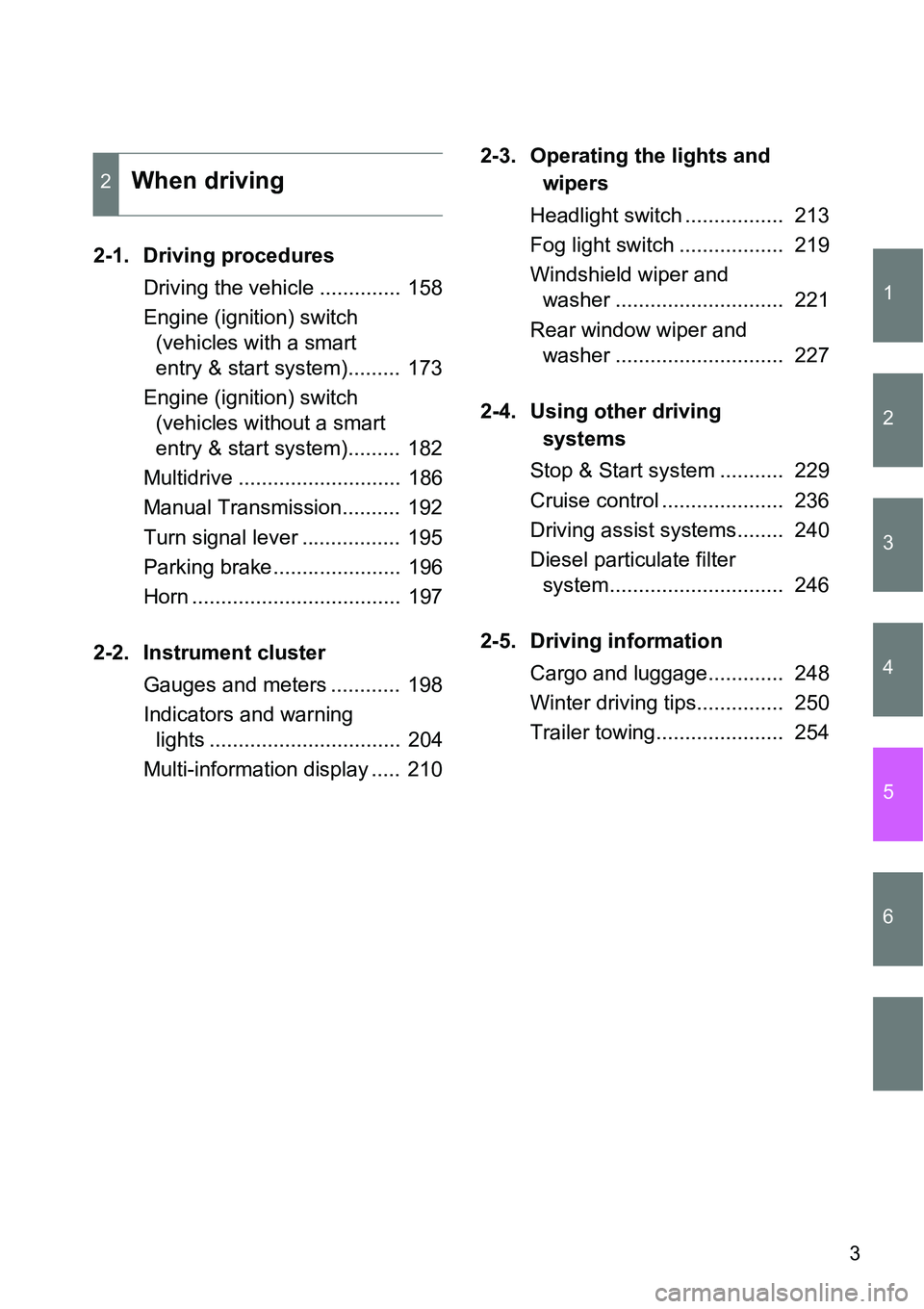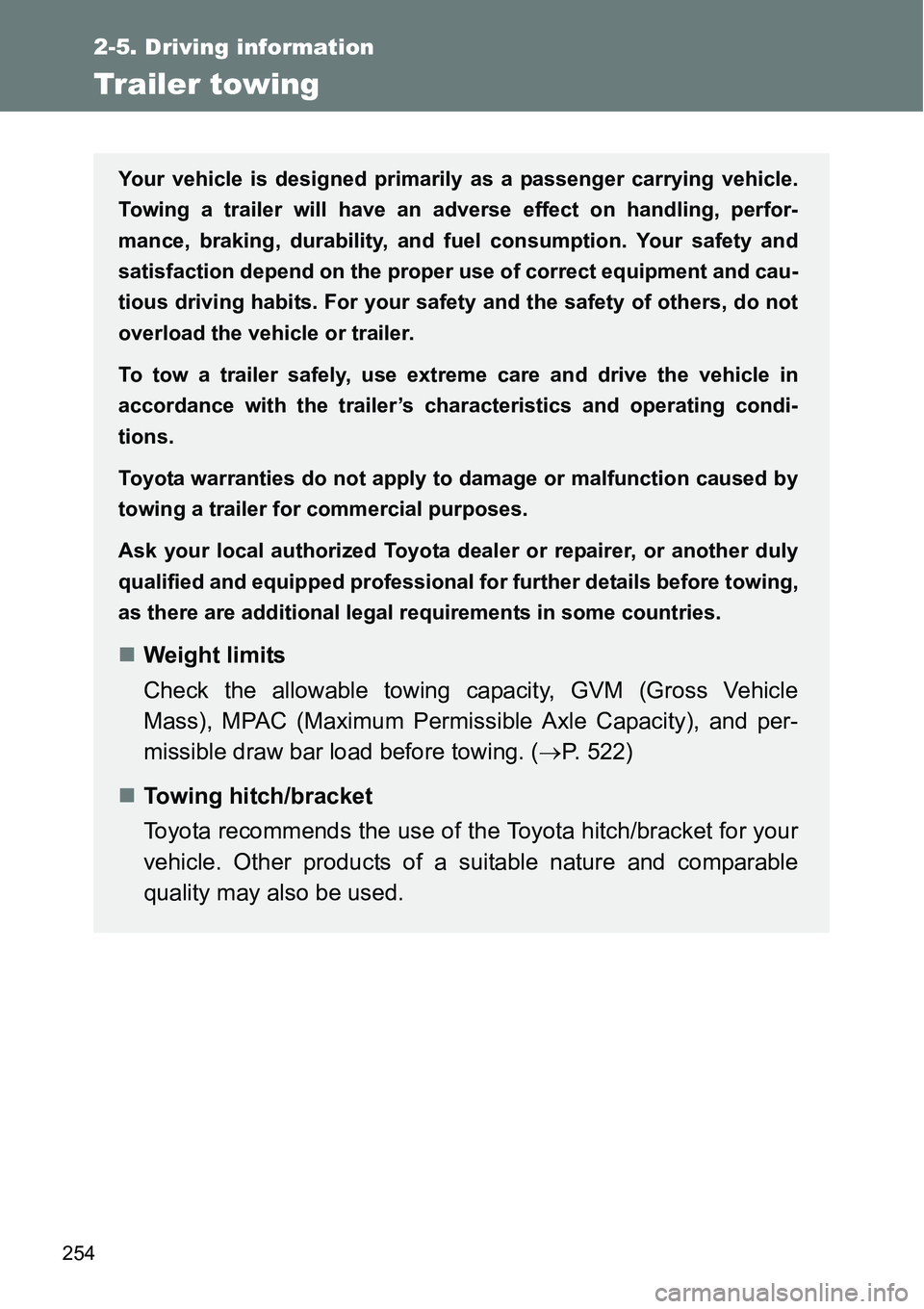Page 3 of 564

1
2
3
4
5
6
3
2-1. Driving procedures
Driving the vehicle .............. 158
Engine (ignition) switch
(vehicles with a smart
entry & start system)......... 173
Engine (ignition) switch
(vehicles without a smart
entry & start system)......... 182
Multidrive ............................ 186
Manual Transmission.......... 192
Turn signal lever ................. 195
Parking brake...................... 196
Horn .................................... 197
2-2. Instrument cluster
Gauges and meters ............ 198
Indicators and warning
lights ................................. 204
Multi-information display ..... 2102-3. Operating the lights and
wipers
Headlight switch ................. 213
Fog light switch .................. 219
Windshield wiper and
washer ............................. 221
Rear window wiper and
washer ............................. 227
2-4. Using other driving
systems
Stop & Start system ........... 229
Cruise control ..................... 236
Driving assist systems........ 240
Diesel particulate filter
system.............................. 246
2-5. Driving information
Cargo and luggage............. 248
Winter driving tips............... 250
Trailer towing...................... 254
2When driving
Page 82 of 564
82 1-3. Adjustable components (seats, mirrors, steering wheel)
CAUTION
After returning the rear seatback to the upright position
Observe the following precautions. Failure to do so may result in death or
serious injury.
Make sure the seatback is securely locked by pushing it forward and rear-
ward on the top.
Check that the seat belts are not twisted or caught in the seatback.
NOTICE
Stowing the seat belts
The seat belts must be stowed before you fold down the rear seatbacks.
Page 86 of 564
86 1-3. Adjustable components (seats, mirrors, steering wheel)
Rear center seat belt
The rear center seat belt is a 3-point type restraint with 2 buckles.
Both seat belt buckles must be correctly located and securely latched
for proper operation.
Push the tab into the buckle.
T
ab “A”
Ta b “ B ”
Push the tab into the buckle until
a clicking sound is heard.
Release method
The rear center seat belt can be completely released only when nec-
essary such as when folding down the rear seat.
To release the hooked tab “B”,
push the buckle release but-
ton.
To release the hooked tab “A”,
insert the key (vehicles with-
out a smart entry & start sys-
tem) or mechanical key
(vehicles with a smart entry &
start system) (P. 3 0 ) o r t a b
“B” into the hole on the buckle.
Retract the belt slowly when
releasing and stowing the seat
belt.
STEP1
Page 157 of 564

2When driving
157
2-1. Driving procedures
Driving the vehicle ............ 158
Engine (ignition) switch
(vehicles with a smart
entry & start system)....... 173
Engine (ignition) switch
(vehicles without a smart
entry & start system)....... 182
Multidrive .......................... 186
Manual Transmission ....... 192
Turn signal lever ............... 195
Parking brake ................... 196
Horn .................................. 197
2-2. Instrument cluster
Gauges and meters .......... 198
Indicators and warning
lights ............................... 204
Multi-information
display ............................ 2102-3. Operating the lights and
wipers
Headlight switch................ 213
Fog light switch ................. 219
Windshield wiper and
washer ............................ 221
Rear window wiper and
washer ............................ 227
2-4. Using other driving
systems
Stop & Start system .......... 229
Cruise control.................... 236
Driving assist systems ...... 240
Diesel particulate filter
system ............................ 246
2-5. Driving information
Cargo and luggage ........... 248
Winter driving tips ............. 250
Trailer towing .................... 254
Page 239 of 564
239 2-4. Using other driving systems
2
When driving
CAUTION
To avoid operating the cruise control by mistake
Switch the cruise control off using the “ON-OFF” button when not in use.
Situations unsuitable for cruise control
Do not use cruise control in any of the following situations.
Doing so may result in loss of control and could cause an accident resulting
in death or serious injury.
In heavy traffic
On roads with sharp bends
On winding roads
On slippery roads, such as those covered with rain, ice or snow
On steep hills
Vehicle speed may exceed the set speed when driving down a steep hill.
When your vehicle is towing a trailer or during emergency towing
Page 254 of 564

254
2-5. Driving information
Trailer towing
Your vehicle is designed primarily as a passenger carrying vehicle.
Towing a trailer will have an adverse effect on handling, perfor-
mance, braking, durability, and fuel consumption. Your safety and
satisfaction depend on the proper use of correct equipment and cau-
tious driving habits. For your safety and the safety of others, do not
overload the vehicle or trailer.
To tow a trailer safely, use extreme care and drive the vehicle in
accordance with the trailer’s characteristics and operating condi-
tions.
Toyota warranties do not apply to damage or malfunction caused by
towing a trailer for commercial purposes.
Ask your local authorized Toyota dealer or repairer, or another duly
qualified and equipped professional for further details before towing,
as there are additional legal requirements in some countries.
Weight limits
Check the allowable towing capacity, GVM (Gross Vehicle
Mass), MPAC (Maximum Permissible Axle Capacity), and per-
missible draw bar load before towing. (P. 522)
Towing hitch/bracket
Toyota recommends the use of the Toyota hitch/bracket for your
vehicle. Other products of a suitable nature and comparable
quality may also be used.
Page 255 of 564
255 2-5. Driving information
2
When driving
Important points regarding trailer loads
Total trailer weight and permissible drawbar load
Total trailer weight
Weight of the trailer itself plus the
trailer load should be within the
maximum towing capacity.
Exceeding this weight is danger-
ous.
(P. 522)
When towing a trailer, use a fric-
tion coupler or friction stabilizer
(sway control device).
Permissible drawbar load
Allocate the trailer load so that
the drawbar load is greater than
25 kg (55.1 lb.) or 4% of the tow-
ing capacity. Do not let the draw-
bar load exceed the indicated
weight. (P. 522)
Page 256 of 564
256 2-5. Driving information
Information tag (manufacturer’s label)
Ty p e A
Gross vehicle mass
Maximum permissible rear
axle capacity
Ty p e B
Gross vehicle mass
Maximum permissible rear
axle capacity
Gross vehicle mass
The combined weight of the driver, passengers, luggage, towing
hitch, total curb mass and drawbar load should not exceed the gross
vehicle mass by more than 100 kg (220.5 lb.). Exceeding this weight
is dangerous.
Maximum permissible rear axle capacity
The weight borne by the rear axle should not exceed the maximum
permissible axle capacity by 15% or more. Exceeding this weight is
dangerous.
The values for towing capacity were derived from testing conducted
at sea level. Take note that engine output and towing capacity will be
reduced at high altitudes.